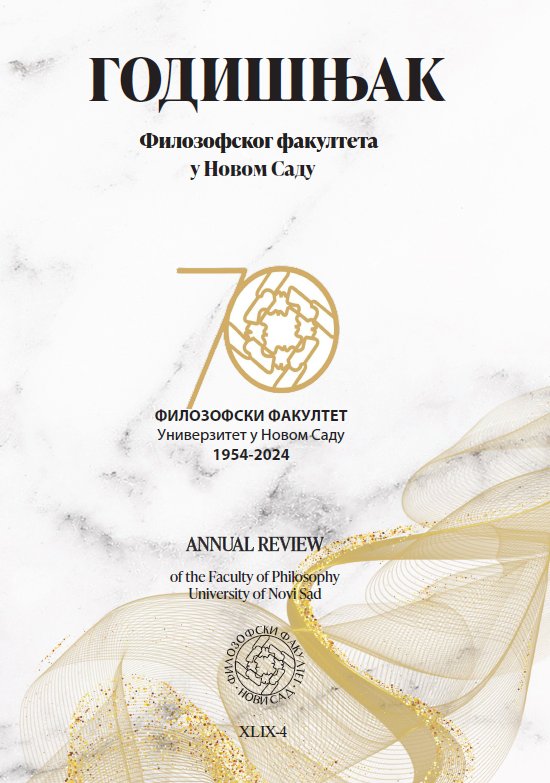LEXEMЕ WORD IN THE ITALIAN AND SERBIAN LANGUAGES: A COGNITIVE-CONCEPTUAL ANALYSIS
Main Article Content
Abstract
In this paper, we have analysed Italian and Serbian collocations and idiomatic expressions with the component (It.) parola / (Ser.) reč (‘word’). The research is based on the analysis of conceptual metaphors in minimal contexts with the observed lexemes. Through conceptual metaphor, we concretize abstract concepts and phenomena by mapping the conceptual structure from a sensory perceptible source domain to a more abstract target domain. The aim of the research is to explore metaphorical mappings between WORD as the target domain and observed source domains through which WORD is conceptualised. The connection between source and target domains is based on cognitive and cultural models. Certain universal experiences create metaphors that are common to different linguistic communities. Nevertheless, each language can use specific images to express the same conceptual metaphor, thus combining universal and culture-specific knowledge. In this paper, a comparative-contrastive analysis of selected expressions is used to establish similarities and differences in the conceptualisation of the notion and lexeme word in the Italian and Serbian linguacultural communities, i.e., identical or culturally specific aspects of the observed conceptual metaphors. The analysis of the observed corpus shows that WORD is conceptualised as OBJECT, THING, SUBSTANCE, and BEING in both Italian and Serbian. The results indicate similarities in the metaphorical conceptualisation of the target domain, as well as numerous examples of lexical and semantic equivalence. Out of 47 observed examples of metaphors, lexical and semantic matching in the three languages is present in 18 cases (e.g., (It.) parole pesanti / (Ser.) teške reči; (It.) parole vuote / (Ser.) prazne reči; (It.) pesare parole / (Ser.) vagati reči; (It.) rimanere, restare senza parole / (Ser.) ostati bez reči). Furthermore, the results of the research show that in some expressions of the same or similar semantics, WORD is conceptualised through different conceptual metaphors in the Italian and Serbian languages (e.g., (It.) troncare le parole in bocca a qualcuno – WORD IS A BODY PART and (Ser.) oduzeti kome reč – WORD IS AN OBJECT). On the other hand, there are expressions with the same or similar lexical structure and expressed by the same conceptual metaphor with differences in semantics (e.g., (It.) venire a parole and (Ser.) doći do reči; (It.) spendere parole and (Ser.) trošiti reči; (It.) perdere la parola and (Ser.) gubiti reči; (It.) troncare le parole in bocca a qualcuno and (Ser.) iščupati reč iz usta; (It.) rimangiarsi una parola and (Ser.) (pro)gutati reči).
Downloads
Article Details

This work is licensed under a Creative Commons Attribution-ShareAlike 4.0 International License.
References
Bartmiński, J. (2011). Jezik-slika-svet. Etnolingvističke studije. Beograd: SlovoSlavia. Blatešić, A. (2023). Nomen est omen. Imena u italijanskoj frazeologiji. Novi Sad: Filozofski fakultet.
Casadei, F. (1995). Per una definizione di „espressione idiomatica‟ e una tipologia dell’idiomatico in italiano. Lingua e stile: rivista trimestrale di filosofia del linguaggio, linguistica e analisi letteraria, 30/2. Bologna: Il Mulino, 335‒358.
Casadei, F. (1996). Metafore ed espressioni idiomatiche. Uno studio semantico sull’italiano. Roma: Bulzoni Editore. Dragićević, R. (2010). Leksikologija srpskog jezika. Beograd: Zavod za udžbenike. (štampano ćirilicom) Drobnjak, D.‒Šulović, K. (2016). Lingvokulturološki triptih. Novi Sad: Filozofski fakultet.
Kövecses, Z. (2010). Metaphor. A Practical Introduction. New York: Oxford University Press.
Lipka, L. (1992). An Outline of English Lexicology. Tübingen: Max Niemeyer Verlag.
Mršević-Radović, D. (1987). Frazeološke glagolsko-imeničke sintagme u savremenom srpskohrvatskom jeziku. Beograd: Filološki fakultet. (štampano ćirilicom)
Prćić, T. (2016). Semantika i pragmatika reči. Novi Sad: Filozofski fakultet.
Lakoff, G.‒Mark J. (1980). Metaphors We Live By. Chicago, London: The University Press of Chicago Press.
Štrbac, G. (2018). Frazeologija o čoveku i čovek u frazeologiji. Novi Sad: Filozofski fakultet. (štampano ćirilicom)
DM: De Mauro, Tullio (2016). Il nuovo De Mauro. Dizionario della lingua italiana, [https://dizionario.internazionale.it] [5. oktobar 2023.]
Matešić, J. (1982). Frazeološki rječnik hrvatskoga ili srpskog jezika. Zagreb: Školska knjiga.
Pittàno, G. (2008). Frase fatta capo ha, Dizionario dei modi di dire, proverbi e locuzioni di italiano. Bologna: Zanichelli.
Quartu, M. (2010). Dizionario dei modi di dire della lingua italiana. Hoepli, sa http://dizionari.corriere.it/dizionario-modi-di-dire
RMS: Rečnik srpskohrvatskoga književnog jezika. I–III: 1967–1969. Novi Sad – Zagreb: Matica srpska – Matica hrvatska; IV–VI: 1971–1976. Novi Sad: Matica srpska. (štampano ćirilicom)
Vocabolario Treccani 2023: Istituto della Enciclopedia Italiana fondata da Giovanni Treccani S.p.A. Online, [https://www.treccani.it/vocabolario/] [5. oktobar 2023.]




